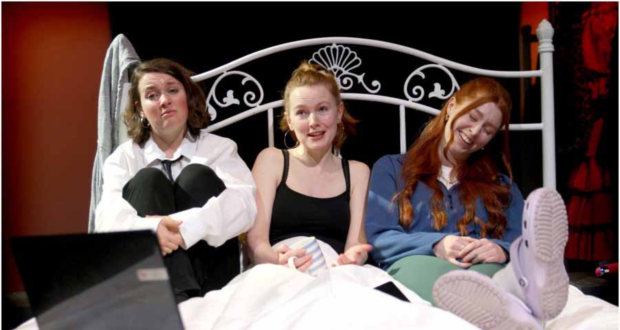Valiant efforts at showcasing writing and directing talent by Tower Theatre produce a little new gem.Summary
Rating
Good
Spring Forward is the biennial showcase of new writing by Tower Theatre’s Writers’ Room, a space to foster new talent and produce previously unpublished plays. This latest edition has produced three new short plays directed, in turn, by new talent, also fostered by the Tower Theatre collective through its New Directors’ scheme.
It is always exciting to turn up to watch unseen material by new voices and to enjoy the creativity of unknown directors, and Spring Forward does not disappoint.
The first short play, Berta and Hal, is a study in characterisation of a recently bereaved, opinionated and lonely house-maker from 1974 Orange Country, USA, penned by Joyce Mulvey and directed by Katie Smith. It’s unclear if the material could be expanded beyond characterisation to a fully fledged plot. However, the nuances in the character of Bertha and the psychological mother-son dynamics involving an eldest child lost to the Vietnam war and the scars left on the younger son by a bully husband are certainly explored to their full potential. Masterful acting by Katerine Holt and Sam Alan makes this a credible and enjoyable short play.
The second play takes a central idea, a very good one indeed, and explores it in two halves. Each half mirrors a narrative of the same event, seen and explained by the two key protagonists from opposite points of view. Telling It, written by Anne Connell and directed by Liam Stewart suffers from mixed acting talent, but Lucy Moss, playing a prostitute who had turned her life around but then relapsed, stands out as completely believable, both when brash and overconfident, as well as when sincerely vulnerable.
The closing play, Swipe, written by Lily Guy-Vogel, and directed by Rosie Barwick, is longer than the previous two, and has everything in spades. It delivers a satisfying and memorable theatre experience. Set in frenetic contemporary London, the plot evolves mostly along the interaction between a 27-year-old feature writer for a nondescript trade magazine and the various anonymous characters met on a handful of dating apps. Some remain anonymous and only make an appearance in the play as their own Instant Messages. The entire text of the messages is acted out, including repetition of emojis and punctuation, called out one by one, with remarkable comedic timing by Mayank Adlakha, Cedric Dumornay and Jack Cavendish. Giving these messages their own casting, ensuring they are wearing an unremarkable outfit and the same grey beanie sporting only a first name tag as they sprint into the limelight at the ping of a mobile phone is the first of many strokes of directing genius by Barwick.
Elle (Eden Vansittart) has a friend and confidante, Sarah, (Ciara Gaughan) so that Elle’s dating life receives real time commentary in the guise of witty girl-talking-men dialogue. But the second stroke of genius, jointly concocted by writer Guy-Vogel and director Barwick, is to give Elle’s parallel internal monologue her own actress, too: a double for Elle who will act out her stream of consciousness (Helen Wieland). This provides much of the hilarity for the play as what Elle, the public persona, says is often contradicted by what Elle’s internal dialogue expresses, either by words, or by phenomenally funny and effective miming.
Swipe is a gem of a play that could be lifted exactly as is onto a stage straight away. A new voice, a brilliant new director and a very talented cast make for outstanding new theatre.
For Spring Forward
Artistic Team Lead : Landé Belo
Lighting Design by: Nick Insley
Sound Design and Operation by: Matthew Ibbotson
Stage Manager: Anna Kidd
Assistant Stage Manager : Richard Davies
Lighting Operator: Sandra Reveira
For Bertha and Hal
Written by: Joyce Mulvey
Directed by: Katie Smith
Assistant Director: Stephanie Irvine
Set Design by: Olga Iliou & Yasemin Buyurgan
Costume Design by: Laura Coulton
For Telling It
Written by: Anne Connell
Directed by: Liam Stewart
Assistant Director: Holly Causer
Set Design by: Chris Shiel
Costume Design by: Kathleen Morrison
For Swipe
Written by: Lily Guy-Vogel
Directed by: Rosie Barwick
Assistant Director: Olympia Christofinis
Set Design by: Poppy Hill & Lucy White
Costume Design by: Laura Coulton
Music Composed by Cameron Pike and Karly Lopez
The Spring Forward showcase from the Tower Theatre’s Writers’ Room has closed, another showcase of new and emerging talent will return later this year.
Further information about Tower Theatre can be found here.
 Everything Theatre Reviews, interviews and news for theatre lovers, London and beyond
Everything Theatre Reviews, interviews and news for theatre lovers, London and beyond



